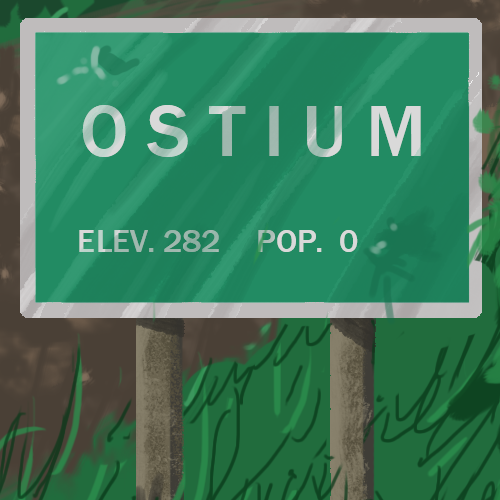
Written by Alex C. TelanderWriting a podcast is very different from writing a novel or short story, in fact I believe it’s more akin to writing for a TV series, but can’t confidently say since I have yet to be hired on to write the next episode of Game of Thrones. The big difference with this type of writing is that it’s episodic: you’re writing shorter pieces in each episode for a longer overarching story. You might think, well, this is pretty similar to writing a novel with individual chapters each telling a part of the longer story of the book. And yes, there are some similarities, but when you’re working on a novel you usually have a deadline in mind many months or sometimes even a year or more down the road. When it comes to a podcast, especially an ongoing one, the deadlines are a lot more . . . oncoming and perhaps seemingly never ending.Some podcasts release a new episode every month, like ars Paradoxica, while most, as is the case with my podcast, Ostium, releases a new episode every two weeks. This means within a two-week period, a podcast episode has to get written, recorded with a cast of one or more actors, and produced with the possible addition of music and sound effects. And the big difference here is that it’s an audio recording versus something you read on the printed page or digital screen. You’re usually working with actors (unless you’re doing it all yourself, which has its own extreme demands), and words sound very different when they’re read aloud compared to being read on the page. Everyone, when they’re reading, has their own voice inside their head giving life and depth to the characters and plot. When words are read aloud they are given a specific life, as read by that particular actor. Actually, some authors choose to have their drafts of works in progress read aloud to hear their words read back to them and edit and rewrite accordingly.When you hear your written words read back at you, any errors, inconsistencies, and glaring typos becoming very apparent and is not at all embarrassing, especially when these actors happen to be good friends of yours and you swear you proof read that episode like five times. But, ultimately, this all helps to make the story better, more compelling, and correctly read. It’s also a lot fun and offers a dynamic very different from the lonely writer working away at the screen listening to the voices in his head.Ostium is a podcast about a man who discovers a hidden town in Northern California while playing the game GeoGuessr. He eventually finds the town and within discovers many buildings with many doors, each with numbers on them. He starts with the first door and behind subsequent doors discovers other worlds. The idea for Ostium began to germinate in the fall of 2015 after I got hooked on a podcast I discovered called Welcome to Night Vale. This was at the beginning of my blossoming interest in podcasts, and I am now subscribed and regularly listen to anywhere from 12 to 15 podcasts. I started talking with my friend about the idea of doing a podcast, and wanted him to voice the main character, Jake Fisher. Now, over a year later, all 10 episodes of Season 1 of Ostium have been written and recorded. Ostium premiered with Episode 1: Population Zero on January 1, 2017, and Episode 2: CROATOAN was released on January 15. Team Ostium now consists of four people, including myself, with two actors (one of which is starting to do some writing for the podcast), and an artist doing artwork for transcripts of the episodes.Podcasts are free to listen to, so creators use sponsors to help fund and support their shows. They also use Patreon and offer “extras” and incentives to those who donate at various levels, such as mini episodes, transcripts, music, exclusive interviews. Ostium has a Patreon page and at the highest donation level offers the opportunity to be on a future episode of the show. Welcome to Night Vale has become a vast enterprise, with the cast performing live episodes to sold-out crowds around the world, as well as publishing an original novel and two collected volumes of transcripts.We are now well into the age of the episodic podcast, with new shows revealing themselves to the world every week. There are not really any set rules on what a podcast has to be, or how long it has to be, meaning really there are no limits to what a podcast can be like. It can be fiction, or nonfiction, or perhaps somewhere in between. It can be ten minutes, twenty minutes or an hour long. However, creators do have to consider when their listeners will be listening to their show: when commuting, while working, or in their spare time, for example. I personally am able to listen to podcasts at my work as a city mail carrier, and have no problems with the length of episodes. But if you have a twenty-minute commute, you may only be able to listen to only part of an episode, depending on its length. Some have profanity, some not. Some have beautiful original music. Some feature atmospheric sound effects that all help to immerse the listener deeper into the story.There’s no limit to what a podcast can be, and there’s no limit on what the listener can do, picking and choosing accordingly like shopping at a bookstore or visiting a library. If you don’t like a podcast — I usually give them ten minutes to hook me — you can move onto the next one. If you love the show, you can rate and review, and support them through their Patreon page or buying from their sponsors. When you subscribe to a podcast through iTunes, as soon as a new episode is available, it automatically gets downloaded for you.Podcasts are really the perfect medium in today’s fast moving, easily-distracted world of entertainment where if it doesn’t grab your attention in a five-second window, you’ve lost interest. Podcasts come in all shapes and sizes, all the better for the listeners of all shapes and sizes.Check out Ostium now: OstumPodcast.com (iTunes)

Alex C. Telander is the creator and host of the Bookbanter blog, now closing in on 1000 book reviews, and featuring over 50 exclusive author interviews. He has self-published two short story collections, Unquiet Slumbers for the Sleepers (yes, Sara Warren [below] did the amazing cover!) and In That Quiet Earth, as well as a young adult novel, Kyra: The First Book of Enchantus. His short story, My Dark Genesis, was published in the anthology, These Vampires Still Don’t Sparkle. He’s currently working on a horror novel called Olague. For info and updates on Alex, follow his blog, or follow him on Twitter: @bookbanter.





